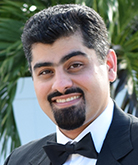Mehrdad Nojoumian

Trust Management
Mehrdad Nojoumian, Ph.D., doesn't have just one research area of interest—he has many. He works in cybersecurity, privacy, artificial intelligence, human-autonomy interactions and other cross-disciplinary research. His research on autonomous cars and human-autonomy recently received international attention when it was featured in the Institute of Electrical and Electronics Engineers' Innovation Spotlight. Dr. Nojoumian is currently an assistant professor in the College of Electrical Engineering and Computer Science.
Here is more information about Dr. Nojoumian, in his own words:
How did you first become interested in autonomous systems?
I have been working on trust management for more than a decade. Due to emergence of autonomous systems such as self-driving cars and robotic systems, I gradually became interested in utilizing my past experience and knowledge in the domain of trust between human and emerging autonomous technologies. Soon, autonomy will occupy all aspects of our lives.
What makes you most excited about autonomous systems?
The most exciting part of my research on autonomous systems is its interdisciplinary nature, i.e., you need to learn techniques and methods in multiple disciplines ranging from computer science and engineering to social sciences.
Tell me about your most interesting research accomplishment
Our most interesting research accomplishment in this domain is the novel methodology that we developed for real-time trust measurement between human and self-driving cars through our immersive virtual reality simulator that utilizes realistic driving videos of South Florida's roads and highways.
What new developments and innovations can we expect to see in autonomous systems, in the next 5 years?
The new developments and innovations will be intelligent controllers that make autonomous vehicles responsive to human emotions, e.g., trust, fear and stress. That is, self-driving cars will be able to establish trust with their passengers during initial dyadic encounters, sustain it over time, and re-build it in the case of incidental failures.
Discuss a positive experience with the Office of Technology Development.
We have filed two utility patent applications on self-driving cars in collaboration with the FAU Office of Technology Development. They have been very supportive in terms of training us on IP-related issues, legal aspects of technology development, filing patents, and marketing strategies.
What is an interesting fact that people at FAU may not know about you?
I'm interested in interdisciplinary science and technology and ready to start new collaborations with anyone on any fascinating topic at any time.